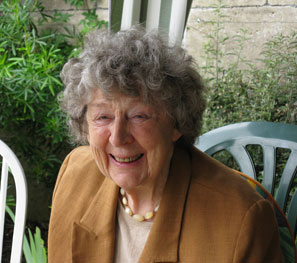Sheila Mundle
Sheila lived at No. 60, which she made a popular venue for SBHA summer parties. In 2008, aged 90, she moved to a maisonette on Bathwick Hill (then a few months later to a flat in Frome).

Sheila Mundle at the 2008 Sydney Buildings Garden Party
Her cheerfulness and liveliness of mind won her many friends, as did her consulting work as a psychologist and bereavement counsellor. But it was her literacy that won her the important job she had during World War Two.
When the war began, Sheila was studying at the Sorbonne in Paris after reading English at Girton College, Cambridge. She returned to Scotland, married a husband she saw little of for the next four years, and in 1941 volunteered to work as an official censor. Merchant ships were assembling in the sea lochs of western Scotland before setting out in convoy, and censorship was one way of keeping their movements secret.
Sheila started the job in Inverness and it had already taken her to London when she heard of a vacancy in the Air Ministry there. She joined up as an ACW2 – Aircraft Woman Second Class – on 17 shillings and sixpence a week plus keep. She was assigned to a department of the Ministry that was responsible for keeping the War Cabinet informed about the results of air attacks on U-boats – number of confirmed and possible sinkings especially.
Her next appointment was as secretary to Air Marshall Sir Douglas Evill, Vice Chief of the Air Staff under Air Chief Marshall Sir Charles Portal (later Viscount Portal of Hungerford). Evill’s previous secretary had been poached by the Foreign Office. “Find me another woman” he said, and they found him Sheila “because she could write minutes”. It was an ability that, together with her gender, made Sheila something of a phenomenon in the top levels of the Air Ministry.
As secretary to a top brasshat, Sheila dealt with ‘most secret’ papers and brushed against people of great importance. She remembers passing on messages from Stalin and Eisenhower, and, late in the war, a phone call from Winston Churchill about getting the union leader Sir Walter Citrine to a conference in Greece.
Probably the most contentious material that passed through her hands concerned what was called “area bombing” – mass air attacks to level areas with key military infrastructure. Early in 1945 RAF Bomber Command wanted to mount a massive, four-day raid on Berlin to “shock and awe” the German people. But flying conditions were not likely to be good for four consecutive days, and Evill argued that less intensive raids on some other places could do just as much damage to the Nazi war machine.
One of them was Dresden, an intact administrative centre through which German troops in large numbers were moving eastwards (and refugees were streaming westwards). The raids there, over two nights in February 1945, were so horrifyingly destructive that they caused revulsion on all sides and were not subsequently repeated in kind anywhere else in Europe.
In the same month Portal accompanied Churchill to a conference with Stalin and Roosevelt at Yalta in the Crimea. Evil remained in Britain as Deputy Chief of the Air Staff. During that time, Sheila recalls, Evill went sick for a while and left her to "look after the shop". Thus, you could say, Sheila briefly took charge of the Royal Air Force!
Chris Morrissey
January 2009
Sydney Buildings History Group ©
UpBack